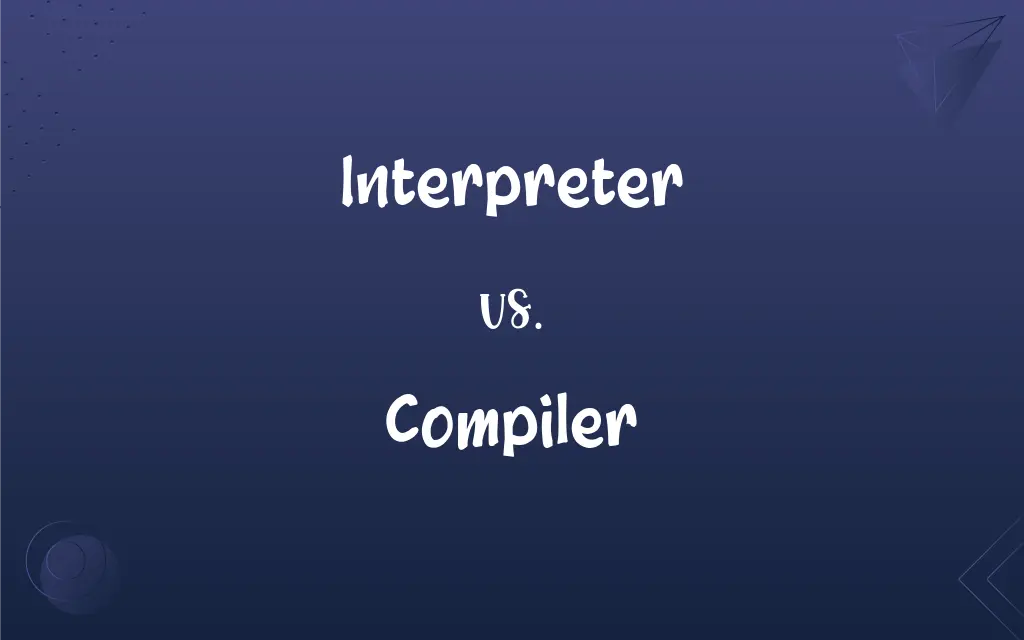Interpreter vs. Compiler: What's the Difference?
Edited by Aimie Carlson || By Harlon Moss || Updated on October 24, 2023
An interpreter translates and executes code line-by-line, while a compiler translates entire code into machine code before execution.

Key Differences
Interpreter and compiler are tools in programming that help convert high-level languages into machine-understandable format. An interpreter translates source code line-by-line and executes it immediately, providing instant feedback. In contrast, a compiler translates the entire source code into machine code or another lower-level language before execution takes place.
While working with an interpreter, developers can see the results of their code instantly. For instance, if there's an error on line 10, the interpreter will stop there and report it. On the other hand, a compiler checks the entire code at once and lists down all errors, if any, after the compilation process.
Interpreters and compilers differ in their speed of execution. Since interpreters process source code line-by-line, they might be slower compared to compilers which, after the initial compilation, execute the compiled code directly and swiftly.
In terms of portability, code that is interpreted is generally more portable, as it requires the interpreter to be present on the target machine. Compiled code, however, is often platform-specific, meaning a program compiled for one type of machine or OS might not run on another without recompilation.
Development environments that utilize interpreters are usually more interactive and suitable for iterative development. Conversely, compiler-based environments are better suited for producing optimized, stand-alone applications.
ADVERTISEMENT
Comparison Chart
Mode of Operation
Translates and executes code line-by-line
Translates entire code before execution
Error Detection
Reports errors line-by-line
Reports all errors after compilation
Execution Speed
Generally slower due to on-the-fly translation
Faster after initial compilation
Portability
More portable, needs the interpreter on the target machine
Platform-specific, may need recompilation for other platforms
Ideal Use
Iterative development, scripting languages
Optimized, stand-alone applications
ADVERTISEMENT
Interpreter and Compiler Definitions
Interpreter
Interpreters provide a dynamic programming environment.
The JavaScript interpreter in browsers allows for dynamic web page interactions.
Compiler
A compiler can optimize code for better performance.
The optimized code from the compiler resulted in a faster-running application.
Interpreter
An interpreter doesn't produce a separate output file.
Unlike compilers, running code with an interpreter doesn't generate an executable file.
Compiler
Compilers produce a standalone output, often an executable.
After compiling the Java code, the compiler produces a .class file.
Interpreter
Interpreters are used for many scripting languages.
Ruby scripts are executed using an interpreter.
Compiler
A compiler is a program that translates source code into machine code or another language.
The C++ compiler converts the source code into an executable file.
Interpreter
An interpreter is a program that executes source code directly.
Python uses an interpreter to run its scripts.
Compiler
Compilers perform a comprehensive error check before code execution.
The compiler listed all syntax errors after the compilation process.
Interpreter
Interpreters convert high-level code into machine code on-the-fly.
With the help of an interpreter, the developer saw immediate results of the code changes.
Compiler
Compilers are used for many high-level programming languages.
Fortran and COBOL are among the languages that rely on compilers.
Interpreter
One who translates orally from one language into another.
Compiler
One that compiles
A compiler of anthologies.
FAQs
Can interpreters be used for large application development?
While possible, compilers are usually preferred for large, optimized applications.
Do compilers produce an executable file?
Yes, compilers often produce an executable or another form of output file.
Which is generally faster in execution, interpreted code or compiled code?
Compiled code is generally faster in execution after the initial compilation.
Do compilers check for logical errors?
Compilers can check for syntax errors but not logical errors; logical error checks rely on testing and debugging.
Can I run compiled code on any machine?
Compiled code is usually platform-specific; you might need to recompile it for different platforms.
Are scripting languages like Python interpreted?
Yes, languages like Python use interpreters.
Do interpreters produce machine code?
Interpreters typically produce and execute machine code on-the-fly without a separate output file.
Can I use both an interpreter and a compiler for a single language?
Some languages, like Java, utilize both, but it's dependent on the language and environment.
Which has a faster startup time, interpreters or compilers?
Interpreters generally have a faster startup time, while compilers might take time initially but execute faster later.
Are interpreted languages slower than compiled ones?
Generally, interpreted languages may be slower due to on-the-fly translation, but the gap has lessened with advanced interpreters.
Which is more memory efficient, interpreted or compiled code?
Compiled code is generally more memory efficient since it's optimized during compilation.
Do I need to recompile my code if I move it to another platform?
Yes, compiled code is often platform-specific and may need recompilation.
Is JavaScript compiled?
JavaScript is primarily interpreted, but modern engines use Just-In-Time (JIT) compilation for performance.
Which tool gives immediate feedback, an interpreter or a compiler?
An interpreter provides instant feedback.
Can compilers optimize code?
Yes, compilers can optimize code for better performance.
Which tool is better for detecting errors?
Both can detect errors; interpreters do it line-by-line, while compilers list all after compilation.
What's the fundamental difference between an interpreter and a compiler?
An interpreter translates and executes code line-by-line, while a compiler translates entire code before execution.
Do all programming languages use either a compiler or an interpreter?
Most languages predominantly use one, but some can use both or a combination, like Java's use of both compiler and JVM.
Is Java code compiled or interpreted?
Java code is first compiled to bytecode and then interpreted or compiled by the Java Virtual Machine (JVM).
Which tool is ideal for iterative development?
Interpreters are more suitable for iterative development.
About Author
Written by
Harlon MossHarlon is a seasoned quality moderator and accomplished content writer for Difference Wiki. An alumnus of the prestigious University of California, he earned his degree in Computer Science. Leveraging his academic background, Harlon brings a meticulous and informed perspective to his work, ensuring content accuracy and excellence.
Edited by
Aimie CarlsonAimie Carlson, holding a master's degree in English literature, is a fervent English language enthusiast. She lends her writing talents to Difference Wiki, a prominent website that specializes in comparisons, offering readers insightful analyses that both captivate and inform.































































